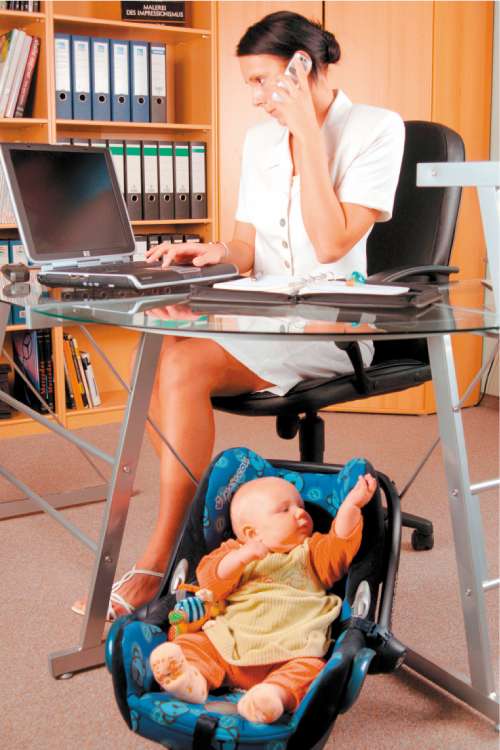US firms in 'bring baby to work' scheme

Maternity leave is hard to come by in the United States. So, too, are families with the wherewithal, or the professional leeway, to have one parent take off from work for months at a stretch. Hence the arrival of a new trend: companies who allow new mothers to bring their babies to work.
It sounds nuts at first, but the trend is catching on – and not just at mother-and-baby related business such as baby carrier manufacturers or Mothering magazine. According to a new lobby group called the Parenting In the Workplace Institute, babies are now a feature at work stations in dozens of design companies, advertising agencies, law firms, banks and food manufacturers.
Generally, the rule is that the babies are welcome until they are old enough to crawl – at about six months, usually. Mothers keep them in bassinets right next to their desks, and either breast-feed them right there, if they have enough privacy, or else take them to a special room to avoid squirming glances from co-workers or clients.
If the mothers are on a strict work timetable, they can sometimes be asked to clock off during the time they are tending to their little ones, so employees without babies don't feel they are picking up any slack.
This being America, many company lawyers ask mothers who bring in their newborns to sign a waiver, so anything that might befall the baby at work is strictly the mother's responsibility.
At the T3 advertising agency in Austin, the Texas capital, about 50 babies have come through the office doors on a daily basis during their first few months of life. The agency, which services high-profile clients including Microsoft and the Marriott hotel chain, came up with the idea after four senior executives all got pregnant within a few months of each other.
"I though, 'what if they don't come back?'," the company's founder, Gay Gaddis, told USA Today. "Now the babies are here, in internal meetings and being fed on meeting tables. It does a lot for morale."
According to the Parenting in the Workplace Institute, established by a single mother of two in Massachusetts, bringing babies to work is "a viable, inexpensive tool for helping employees return to work sooner, lowering turnover, improving morale, increasing overall productivity, enhancing teamwork and collaboration, recruiting new employees, attracting new customers, and making existing customers more loyal".
That sounds way too good to be true to many employers, who would rather do anything to help mothers and their newborns short of seeing the little ones show up on a regular basis.
Ernst & Young, the accounting giant, offers subsidised child care in the home to help new mothers get back to work quicker.
Carla Moquin of the Parenting in the Workplace Institute argues that works against mother-baby bonding. A baby who is always close to his or her mother, she argues, is a baby who cries less, suffers from colic less often and is likely to become a more successful child.
She has found valuable support in Kathleen Sebelius, the governor of Kansas who brought her own infant sons into work when she ran her state's trial lawyer's association in the 1980s and now allows babies in the workplace at 21 state agencies.
North Dakota, which – just like Kansas – is losing population fast, is similarly liberal about babies in the public-sector workplace.
The trend remains relatively minor – the number of employers with a formal baby tolerance policy is believed to number no more than a few dozen – but still inspires horror in some baby-intolerant working stiffs. "I do not go to work every day to listen to the breeders' brats scream all day and to smell their baby poo diapers," one enraged reader responded to a piece on the topic in Time magazine. "And I certainly don't want to walk past a cubicle to see some woman breastfeeding her baby. NO."
Join our commenting forum
Join thought-provoking conversations, follow other Independent readers and see their replies
Comments
Bookmark popover
Removed from bookmarks